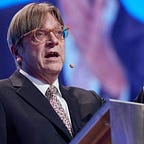Europe will only be unified by stories
‘It is easier to make sweeping generalisations about others if we know close to nothing about them; if they remain an abstraction’, writes Elif Shafak in The Guardian. So much of the friction in societies starts with a total lack of interest in other people — in denying other people’s humanity — and much of the factionalism in today’s global politics is a result. ‘To move forward, we need to reverse the process: start by rehumanising those who have been dehumanised. And for that we need the art of storytelling.’
It’s the stories from Belarus that are turning my stomach at the moment. You tend to think of geopolitics in terms of maps and airplanes and big men sitting around big mahogany tables with flags on them — abstractions, just like their victims — but this if how it really happens: normal everyday people who take a stand against dictatorship and fight for their own normal lives; eminently recognisable kids in football shirts and women in white dresses who don’t want to make history — they just want something we too would recognise as a valuable life. And they end up jailed and beaten and teargassed as a result. Dehumanised by their own government.
Before you ask what we can do about it, you need to feel involved, and that starts with the seeing the essential humanity of it all. Look at Minsk today, then look at Vilnius or Warsaw not too long ago, and look at Prague and Budapest and Berlin a generation earlier… Only then do you realise that this is about us. The geopolitics changes, the dictatorships change course, but the people are the same. And they deserve to live in a democracy, just like we do. For all their bravery, perhaps they deserve it a bit more.
Politics is about the stories we tell of other people and about the stories we tell about ourselves as a community. Wolfgang Münchau had a great piece in the Financial Times a while ago, venting his frustration about ‘the poverty of pro-European discourse’. Not a traditional subject for an economist, you would think, but he rightly argued that the stories we tell matter a great deal for the policies we make and the chances we have of selling them to the people we represent… and the European Union has not been very succesful at that: ‘There is a failure to speak truth to power, grandstanding rhetoric, scaremongering and a trend towards European identity politics.’ Stale or silly rhetoric, in combination with silence, is what often makes even Europe’s successes go nowhere.
The EU has become a full-blown democracy in its own right rather late — it held on to its comfortable but anachronistic status as a diplomatic project ‘till the 1990s, way too long — but now it needs to start acting like one. So speak to citizens directly, not just to inform them but to argue and convince! That demands narratives that are both more realistic and bolder at the same time.
Europe’s story has always started from the top as well as from the bottom up: from global threats and outside forces too big to handle for our countries on their own, but also from people just like those we see in Belarus today, who demanded proper democratic government and saw European integration as their guarantee. Now that democracy and multilateralism are under pressure world wide, and now that people across Europe more than ever need to know what the EU stands for in this world, we need to get the real story of Europe out.
The Conference on the Future of Europe is the way to do that: focus on the essence of what makes us European and what binds us as a European Union. Only if we master the art of storytelling first — get the story right, loud and clear — will we master the art of European politics later.
